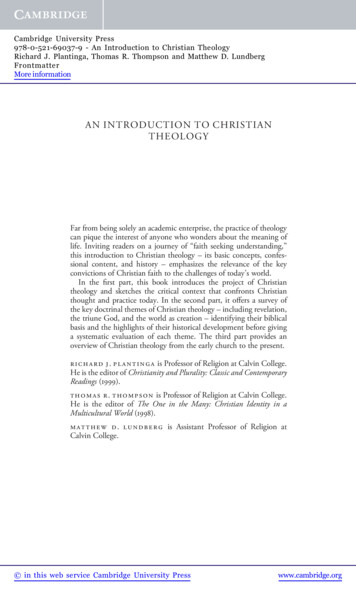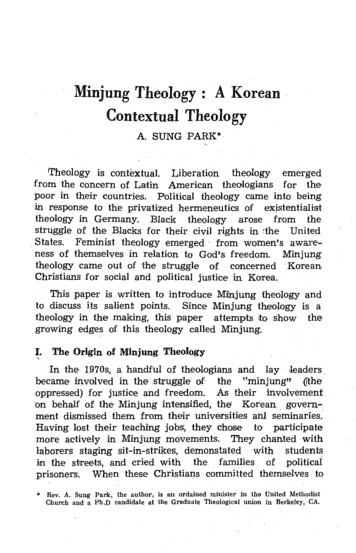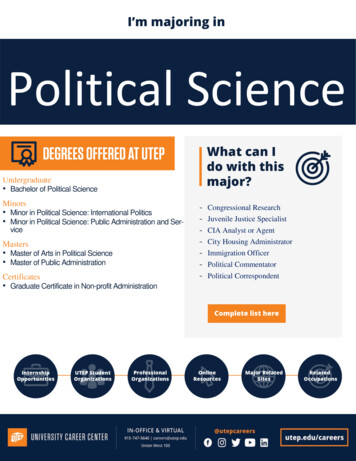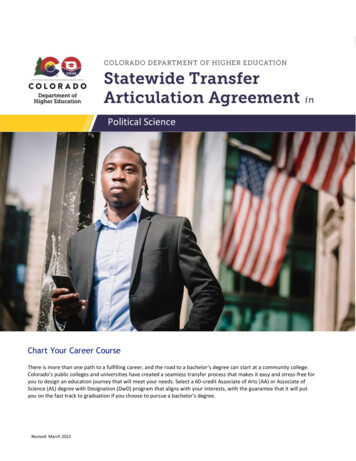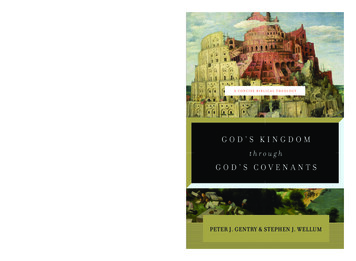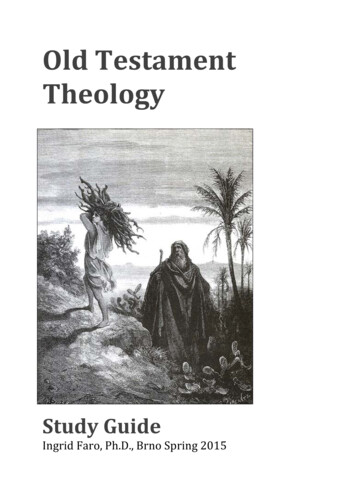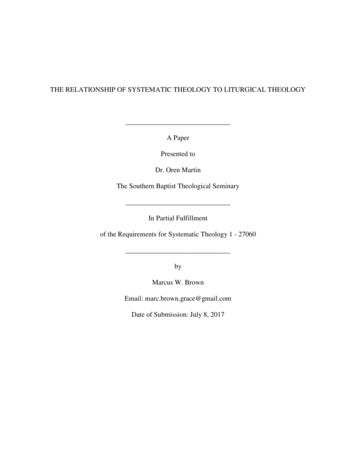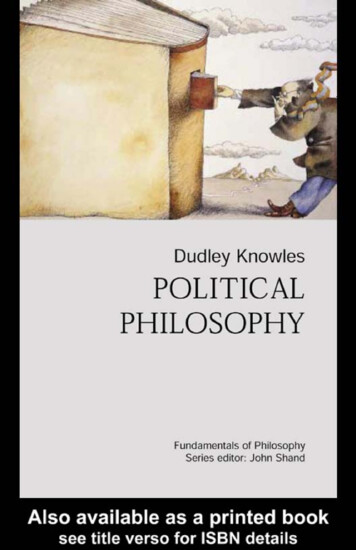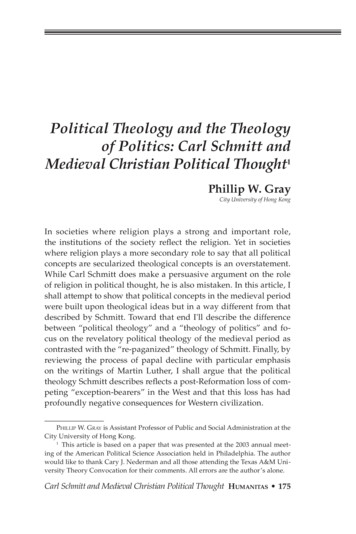
Transcription
Political Theology and the Theologyof Politics: Carl Schmitt andMedieval Christian Political Thought1Phillip W. GrayCity University of Hong KongIn societies where religion plays a strong and important role,the institutions of the society reflect the religion. Yet in societieswhere religion plays a more secondary role to say that all politicalconcepts are secularized theological concepts is an overstatement.While Carl Schmitt does make a persuasive argument on the roleof religion in political thought, he is also mistaken. In this article, Ishall attempt to show that political concepts in the medieval periodwere built upon theological ideas but in a way different from thatdescribed by Schmitt. Toward that end I'll describe the differencebetween “political theology” and a “theology of politics” and focus on the revelatory political theology of the medieval period ascontrasted with the “re-paganized” theology of Schmitt. Finally, byreviewing the process of papal decline with particular emphasison the writings of Martin Luther, I shall argue that the politicaltheology Schmitt describes reflects a post-Reformation loss of competing “exception-bearers” in the West and that this loss has hadprofoundly negative consequences for Western civilization.Phillip W. Gray is Assistant Professor of Public and Social Administration at theCity University of Hong Kong.1This article is based on a paper that was presented at the 2003 annual meeting of the American Political Science Association held in Philadelphia. The authorwould like to thank Cary J. Nederman and all those attending the Texas A&M University Theory Convocation for their comments. All errors are the author’s alone.Carl Schmitt and Medieval Christian Political Thought Humanitas 175
What does the term “political theology” mean? There is no limitto what it can mean: all theology may be considered “political”(from a postmodern perspective), or certain modern ideologiesmay be termed “political religions” (as, e.g., in Voegelin’s writings),and so on. The work of Carl Schmitt presents another perspective.For Schmitt, political theology is the structure of political conceptsas related to their origin in theological concepts. Within Schmitt’sview of the political, the theological notion of God transfers to thepolitical sovereign a final and total authority in the person of amain decision-maker in extreme emergencies, an “exception-bearer” with whom the power of the state ultimately lies. The notion ofthe Absolute in religion is used in conceptualizing the Absolute inthe state, starting with the “divine right of kings” and extending tothe crisis of Schmitt’s own time.Is Schmitt’s idea of political theology, both in itself and in connection to the rest of his thought, correct? It is partially correct,but not in the way that Schmitt believes. His understanding of theconnection between theology and politics is one-sided and misleading. The problem is that he begins his examination of politicaltheology at the time of Bodin and the absolutizing of the theoryand practice of monarchy while ignoring earlier European experience. The particular historical period at which Schmitt chooses tobegin his study is significant because institutional religious insightinto the political and (more importantly) religious insight informing the political were much diminished by the time "divine right"doctrines held sway. This leads the reader of Schmitt to understandtheology through politics rather than politics through theology.Beginning his study at an earlier point in Western history mighthave expanded his overly narrow view of political theology. Still,Schmitt’s analysis does clarify the modern situation, but in doingso it clarifies the problematic nature of post-Reformation politicaltheology compared with that of the time before Luther.Although Schmitt ignores the distinction, medieval politicalideas were shaped much differently than their post-Reformationcounterparts. The resulting error on Schmitt's part is his failure totake sufficiently seriously the theological understanding of politics.This is where the distinction between “theology of politics” and“political theology” comes into play.2 Political theology has at leastIt should be made clear that this distinction between “political theology” andthe “theology of politics” is not the author’s own creation. However, the author has2176 Volume XX, Nos. 1 and 2, 2007Phillip W. Gray
two, sometimes overlapping meanings. One is the sense of Schmittthat politics begins to appropriate notions from theology as societies secularize, thus making politics a matter of theology; the otheris the ideological use of theology to mask political motivations.Both forms of political theology spring from secularization. Thetheology of politics, on the other hand, starts from an explicitlytheological framework. This theological framework can be eithernatural or revelatory theology, and in the medieval period it wasboth. Politics was seen in the context of the powers of humans andalso within a larger realm encompassing objective rights, naturalorder, and divine obligations. Moreover, revelatory theology cameto contextualize politics even more than natural theology, as Christian notions of being, existence, and charity had political ramifications that had not been anticipated by the pre-Christian thinkers.Revelatory theology of the Catholic strain adds another element aswell: the institutional. To put it bluntly, the relation between politics and theology in Western history cannot be understood withouta discussion of the Roman Catholic Church, which is dependent onan explicitly revelatory theology. By looking at the interactions between the church and the various political bodies during the middle ages, the theology of politics in action, or “revelatory” politicaltheology, is clarified. Schmitt’s political theology, on the other hand,having its origins after the Reformation, reflects what might bestbe referred to as a “natural” political theology from which virtuallyall traces of direct revelatory insight have been removed. Schmitt’stheology is, for lack of a better term, “re-paganized.”Political Theology and the ExceptionFor Schmitt, political theology is an explanation of how political concepts were formed in the modern state. These politicalconcepts are both structurally and conceptually similar to thoseof theological systems. In describing political theology, Schmittwrites:All significant concepts of the modern theory of state are secularizedtheological concepts not only because of their historical development—in which they were transformed from theology to the theoryof state, whereby, for example, the omnipotent God became the omnipotent lawgiver—but also because of their systematic structure,the recognition of which is necessary for a sociological considerationbeen unable to locate the article or book that initially presented this distinction.Carl Schmitt and Medieval Christian Political Thought Humanitas 177Accordingto Schmitt’spoliticaltheology, allsignificantconcepts ofthe moderntheory of stateare secularizedtheologicalconcepts.
of the concepts. The exception in jurisprudence is analogous to themiracle in theology.3The God involved in this definition is rather abstract. This Godis omnipotent, and miracles are possible in His system; but there isno mention of divine history, creation acts, various prophets, theResurrection, or much else that is historically concrete. God is, interms of anything specific, rather plain—a sociological constructreally, which is a point of importance below.Schmitt considers political theology through his sociologicalmethod, according to which society is shaped by reigning metaphysical understandings. Schmitt writes:The metaphysical image that a definite epoch forges of the worldhas the same structure as what the world immediately understandsto be appropriate as a form of its political organization. The determination of such an identity is the sociology of the concept ofsovereignty.4With the passage of time the metaphysical image changes. Whenthe idea of a sole sovereign reigned (Schmitt places this idea in theseventeenth and eighteenth centuries), political systems reflectedthis sole-sovereign notion, such as in Hobbes. Later, influencedby more diffuse ideas of God and/or metaphysical reality, politicsshifted more towards democracy, or as Schmitt puts it, “[e]verything in the nineteenth century was increasingly governed by theconception of immanence.”5 However, with this immanence camean inability to make decisions in desperate times, so that, while notions of sovereignty changed, determining where sovereignty actually lay became problematic. The problematic role of immanence isreflected best in Schmitt’s understanding of the emergency or “theexception.”The notion of the exception is central in Schmitt’s thought.Indeed, he begins the first chapter of his Political Theology withthe claim, “Sovereign is he who decides on the exception.”6 ForSchmitt,[t]he exception, which is not codified in the existing legal order,can at best be characterized as a case of extreme peril, a danger tothe existence of the state, or the like. But it cannot be circumscribedCarl Schmitt, Political Theology: Four Chapters on the Concept of Sovereignty,trans. George Schwab (Cambridge: MIT Press, 1985 [1934]), 36.4Ibid., 465Ibid., 49.6Ibid., 5.3178 Volume XX, Nos. 1 and 2, 2007Phillip W. Gray
factually or made to conform to a preformed law.In dealing with political theology, Schmitt sees the use of thetheological concept of God’s sovereignty as providing the statewith a model of political sovereignty. The exception is importantto Schmitt, for it must be remembered that he is not concentratingon routine situations. As George Schwab explains, “[f]or Schmittthe sovereign authority not only was bound to the normally validlegal order but also transcended it. . . . [Schmitt’s] sovereign slumbersin normal times but suddenly awakens when a normal situationthreatens to become an exception.”7 While Schmitt refers to Bodin’snotion of sovereignty,8 he more accurately owes his intellectuallineage to the English author Thomas Hobbes. Schmitt says aboutHobbes’s formulation:Schmitt seestheologicalconcept ofGod's sovereignty asprovidingmodel ofpoliticalsovereignty.The form that [Hobbes] sought lies in the concrete decision, one thatemanates from a particular authority. In the independent meaningof the decision, the subject of the decision has an independent meaning, apart from the question of content. What matters for the realityof legal life is who decides.9Schmitt is here presenting the groundwork for his political theology. As the sovereign takes on the elements of divine sovereigntythe decision of this newly deified entity becomes important. Forthe remainder of this article, I shall refer to those with the abilityto decide when there is an exception and to make a decision during it as “exception-bearers”: those who have to bear the decisionsduring an exception, but who also bear the power to declare that anexceptional situation exists. Like God, this exception-bearer couldmake the needed decisions without hindrance and must be the final and sole authority. Schmitt believes liberal democracy, a systemthat diffused and diluted sovereignty (following the immanentizing patterns of the nineteenth century), lacks this ability to decide.When he discusses the Spanish Catholic political philosopherDonoso Cortés on the conflict between “Catholicism and atheistsocialism,” he takes this example:[I]t was characteristic [according to Cortés] of bourgeois liberalismnot to decide in this battle but instead to begin a discussion. Hestraightforwardly defined the bourgeoisie as a ‘discussing class,’ unaIbid., xvii-xviii (emphasis added).Ibid., 8-9; cf. Jean Bodin, On Sovereignty: Four Chapters from “The Six Books ofthe Commonwealth,” trans. Julian H. Franklin (Cambridge: Cambridge UniversityPress, 1992 [1576]).9Schmitt, Political Theology, 34.78Carl Schmitt and Medieval Christian Political Thought Humanitas 179Immanentization viewedas havingbrought liberaldemocracy,whichdiscussesinterminablyand lacksability todecide in acrisis.
clasa discutidora. It has thus been sentenced. This definition containsthe class characteristic of wanting to evade the decision. A class thatshifts all political activity onto the plane of conversation in the pressand in parliament is no match for social conflict. 10While Schmitt attempts to give a description of the developmentof the theory of state, he also makes a normative pronouncement.Dealing with major emergencies, the “exception,” is of key importance, and a style of governing that ignores the importanceof the decision in such dread situations is not equipped for theemergency. This is clear in a different work of Schmitt’s, where heexplains:In a very systematic fashion liberal thought evades or ignores stateand politics and moves instead in a typical always recurring polarity of two heterogeneous spheres, namely ethics and economics,intellect and trade, education and property. The critical distrust ofstate and politics is easily explained by the principles of a systemwhereby the individual must remain terminus a quo and terminus adquem. In case of need, the political entity must demand the sacrificeof life. Such a demand is in no way justifiable by the individualismof liberal thought.11This emphasis on the individual as against the political and thestate prevents the liberal system from combating threats againstthe state. For Schmitt, this inability is a damning indictment ofmodern liberal parliamentarianism.His critique of liberalism is also influenced by the dichotomy hePoliticalsees as defining the political. For Schmitt, “[t]he specific politicalactions anddistinction to which political actions and motives can be reducedmotivesis that between friend and enemy.” 12 Again, following Hobbes,reduced tofriend–enemy Schmitt considers conflict the key element of the political:distinction.War is neither the aim nor the purpose nor even the very content ofpolitics. But as an ever present possibility it is the leading presupposition which determines in a characteristic way human action andthinking and thereby creates a specifically political behavior. 13In Schmitt’s view, a world without war would lose the friend–enemy distinction and thus be “a world without politics.”14 In this way,the “political” can also encompass other spheres. So, if religiousIbid., 39.Carl Schmitt, The Concept of the Political, trans. George Schwab (Chicago: TheUniversity of Chicago Press, 1996 [1932]), 70-71.12Ibid., 26.13Ibid., 34.14Ibid., 35.1011180 Volume XX, Nos. 1 and 2, 2007Phillip W. Gray
communities go to war (whether with other religious groups ornot), it “is already more than a religious community; it is a politicalentity.”15 “The real friend–enemy grouping is existentially so strongand decisive that the nonpolitical antithesis, at precisely the moment at which it becomes political, pushes aside and subordinates”the other elements (religion, etc.), instead turning its focus “to theconditions and conclusions of the political situation at hand.”16Whatever else may be substantively involved, these groups becomepolitical because “[w]hat always matters [for the political] is onlythe possibility of conflict.”17 With this conflict-orientation, Schmittconnects his notion of the political to the exception:. . . in the orientation toward the possible extreme case of an actualbattle against a real enemy, the political entity is essential, and it isthe decisive entity for the friend-or-enemy grouping; and in this(and not in any absolutist sense), it is sovereign. 18Although we can see how the political dichotomy, the exceptionbearer, and political theology are intertwined in Schmitt’s thought,there are problems. Can there be two exception-bearers over onepeople? What happens when a religious community becomes political, especially if the conflict that makes the religious group political causes one political entity (the religion) to go against another(the state) having sovereignty over the same population? Whichauthority can demand the sacrifice of life?Remembering Caesar, Remembering GodThe inadequacy of Schmitt's political theology derives from neglect of certain salient scriptural passages, including “tunc ait illisreddite ergo quae sunt Caesaris Caesari et quae sunt Dei Deo”(Matthew22:21); and “at illi dixerunt Domine ecce gladii duo hic at ille dixit eissatis est”(Luke 22:38).19 These two passages, in particular, haveilluminated the relation of theology and politics in the West foralmost two millennia. Such a relation cannot be adequately explored without reference to scriptural, theological, and ecclesiastical sources. The corpus of St. Augustine,20 for example, offers aIbid., 37.Ibid., 38.17Ibid., 39.18Ibid.19The Latin text for Gospel phrases is taken from the Vulgate, located at http://www.latinvulgate.com/.20Augustine, City of God, trans. Henry Bettenson (London: Penguin Books,1516Carl Schmitt and Medieval Christian Political Thought Humanitas 181For Schmitt,the politicalalwaysconcerns thepossibility ofconflict, hencethe need forthe exceptionbearer.
Contrary toSchmitt, theexception presents a problemfor anylaw-governedsociety withsome notion ofrepresentation.profound repository of insight into the relation of theology andpolitics, and historical controversies such as the Arian heresy 21 orthe confrontation between St. Ambrose and the Roman EmperorTheodosius22 further illuminate the confluence of the spiritual andtemporal realms.As shown by Gilson, the effects of Christian thinking on philosophy and religion during the medieval period were extensiveand structured by revelation.23 Considering the structuring factors,such as the two scriptural phrases above, becomes necessary in anyunderstanding of political theology (“re-paganized” or otherwise)or the theology of politics.24 Historically, the political theologytht Schmitt analyzes is a turning away from revelation towards atheologico-political understanding resembling that found in (Roman) antiquity.Schmitt’s error arises from his understanding of the exception.First, his attack upon liberal democracy’s concept of the exception is overly specific. The exception presents a problem for anylaw-governed society having some notion of representation. Moreimportantly, the exception itself becomes an issue due to a conflictthat is not purely state-oriented. 25 Throughout the medieval period, who decided on the exception was itself the object of battle,fought most importantly between papal and imperial authorities.The implicit notion of the exception was fostered, aided, andgrew within the framework of at least two centers of authority attempting to gain dominance, both sharing in the claim that their1984); Augustine, St. Augustine: Writings Against the Manichaeans and Against theDonatists, trans. Richard Stothert and Albert H. Newman. Vol. 4, The Nicene andPost-Nicene Fathers (First Series), ed. Philip Schaff (Edinburgh: T&T Clark, 1996).21John Henry Cardinal Newman, The Arians of the Fourth Century, 3rd ed. (London: Gilbert and Rivington, 1871).22Cf. Neil B. McLynn, Ambrose of Milan: Church and Court in a Christian Capital(Berkeley: University of California Press, 1994), 315-330.23Étienne Gilson, The Spirit of Mediaeval Philosophy, trans. A. H. C. Downs(Notre Dame: University of Notre Dame Press, 1991 [1936]).24This being said, it must be remembered that the situation under considerationis of the West and its unique circumstances. While many of Schmitt’s ideas on thepolitical and such may be more broadly applicable, his notion of political theologyassumes the Western situation. The theologico-political development in other placeswas quite different.25While Schmitt himself does not make these connections, the following argument is not inconsistent with possible implications within Schmitt’s work. Cf. CarlSchmitt, Roman Catholicism and Political Form, trans. G. L. Ulmen (Westport: Greenwood Press, 1996), 18-22 and passim.182 Volume XX, Nos. 1 and 2, 2007Phillip W. Gray
source of power (as well as their opponent’s) was from God. 26The tension between these two authorities is key to understanding the notion of the exception. Without the countervailing forceof the other center, an explicit notion of the exception may havebeen unnecessary, because one center of authority would havebeen presumed to be the rightful exception-bearer. Had the secularauthorities lost against the papal center, the political systems of theWest would have been predominantly theocratic. In actual history,however, without the tension caused by the papal authority claiming power to become involved in political disputes for “reasons ofsin,” the emperors could have better solidified themselves as thesole exception-bearers, citing the “divine right” of kings.Both centers of authority, while making claims against the other,acknowledged that their counterpart had authority. As Gierkenotes:. . . in all centuries of the Middle Ages Christendom, which in destiny is identical with Mankind, is set before us as a single, universalCommunity, founded and governed by God Himself. . . . [A]longwith this idea of a single Community comprehensive of Mankind,the severance of this Community between two organized Orders ofLife, the spiritual and the temporal, is accepted by the Middle Agesas an eternal counsel of God.27This state of affairs does not mean that no conflicts between thetwo institutional “Orders of Life” ever occurred. Rather, it reflectsthe medieval concern that both powers, if not every officeholder,had divine legitimacy. This view is illustrated by Pope BonifaceVIII’s bull Unam Sanctam (1302) against King Philip IV of Francewhen he says,Both [swords] then are in the power of the church, the material andthe spiritual. But the one is exercised for the church, the other by thechurch, the one by the hand of the priest, the other by the hand ofkings and soldiers, though at the will and suffrance of the priest. 28As in footnote 1, this idea of “two centers of authority” is not original. The notion is inspired by the discussion of “mediating institutions” and “the naked publicsquare;” cf. Richard John Neuhaus, The Naked Public Square: Religion and Democracyin America (Grand Rapids: William B. Eerdmans Publishing Company, 1984). This isan extrapolation from Neuhaus’s work, and any error is the author’s alone.27Otto Gierke, Political Theories of the Middle Age, trans. Frederic William Maitland (Bristol: Thoemmes Press, 1996 [1900]), 10.28Boniface VIII, “The bull Unum Sanctum (November 1302),” in Brian Tierney,The Crisis of Church and State 1050-1300 (Toronto: University of Toronto Press, 1964),189.26Carl Schmitt and Medieval Christian Political Thought Humanitas 183
Given that Boniface was attempting to garner greater power to thespiritual sword, his use of the two swords terminology is interesting as it illustrates the strength of the idea even with one who wasattempting to go against it in practice. Holy Roman Emperor HenryIV provides another example: while in the midst of the InvestitureControversy and while accusing Pope Gregory VII of abandoningthe Faith, he exhorts the German bishops to “see to it that you donot withdraw assistance from the oppressed Church, but ratherthat you give sympathy to the kingship and to the priesthood.” 29It is clear that in both these cases the writer claims that the otherpower has overstepped its authority and wishes to bring more control to himself. But that the opposing center did have importancefor the same population and had legitimate authority of some typewas not denied.It was not until later, when kingship was absolutized, that theidea of either exception-bearer as beyond the authority of the otherstarted to make an appearance. Historically, the state became thesole exception-bearer due to a number of papal defeats and internal divisions, which left the spiritual center of authority weakened.As early as the Investiture Controversy, the papacy (while stillholding strong theoretical power) was showing signs of comparative weakness. This would continue over the centuries in variouscontroversies between the spiritual center of authority and theHoly Roman Emperors (such as Frederick II) and later between thechurch and various national kings (especially Philip IV of France inthe late thirteenth and early fourteenth centuries). Additionally, thechurch was suffering from internal dissensions, including theological disagreements (such as whether or not to use Aristotle’s works),outright dissent (in the works of authors like Wycliff and Ockham),and outright heresies (the Cathars being the primary example).Institutionally, in the aftermath of the Consiliar Movement, thepapacy itself become stronger within the church, while the GreatSchism and the multitude of popes in that time diminished thechurch itself in the West compared to the budding states. Finally,there was the Protestant Reformation, which served as the breaking point for the spiritual center’s strength against the state.While the weakening of the church in the centuries before theReformation is of great importance, the Reformation itself cementedthe subordination of the church to the state. First, the split in the29Henry IV, “Letter of Henry to the German bishops (1076),” in Ibid., 61.184 Volume XX, Nos. 1 and 2, 2007Phillip W. Gray
church removed the “awe” of the spiritual institution.30 The apostolic succession, the key sacramental elements of the church’s mission,and more were questioned. The political leader of a territory had theadvantage of eliciting awe with his military and temporal might, butthe church relied on its then rapidly diminishing spiritual authority.Second, the church and the Reformers shared the need for temporal assistance, and temporal leaders showed themselves readyto assist. But such assistance had its costs. For the Catholic Church,quarrels with the French king and the general independence of theFrench Church had to be muted. For the Reformers, however, thesituation was worse as, effectively, the Reformers’ churches becamedepartments of the state. This dependence had various effects. TheReformed churches lacked an explicitly separate institution thatcould support disagreements with the state—as it was, the churches were governed and controlled enough by state apparatuses tolimit critique and, more importantly, curtail the opportunity forcompeting spiritual centers of authority to arise. The churchestended to become nationalized. While there are certainly manycauses for this nationalization, the dependence of the churches onthe state no doubt played a large role.Third, some of the Reformed theology itself tended to promotethis subordinated role of church to state. Specifically, the writingsof Martin Luther on secular authority tended to support a subservient role for the Reformed churches vis-à-vis the state. This reflectsLuther’s primary concern with the spiritual life and individual salvation. The effect was to atomize society, rendering the individualnaked before the state, without a strong, institutional church to actas a check on the state.The first justification for the re-paganized natural politicaltheology of Schmitt can be found in Luther’s notion of the “twokingdoms.” Luther claims that both the kingdom of the Gospel andthe secular kingdom should remain, “the one to protect piety, theother to bring about external peace and prevent evil deeds; neitheris sufficient without the other.”31 As he describes it, the world itself isnot hospitable towards Christianity:30For the significance of awe, cf. Joseph de Maistre, Considerations on France,trans. Richard A. Lebrun (Cambridge: Cambridge University Press, 1994 [1797]),41-48.31Martin Luther, “Secular Authority: To What Extent It Should Be Obeyed”(1523), in Martin Luther: Selections from His Writings, ed. John Dillenberger, trans. J. J.Schindel (New York: Anchor Books, 1962), 371.Carl Schmitt and Medieval Christian Political Thought Humanitas 185The Reformation cementedthe subordination of thechurch to thestate.An effect ofReformedtheologywas theatomizationof society.
. . . the world and the masses are and always will be unchristian,although they are all baptized and are nominally Christian. Christians, however, are few and far between, as the saying is. Thereforeit is out of the question that there should be a common Christiangovernment over the whole world, nay even over one land or company of people, since the wicked always outnumber the good. 32With this thought in mind, problems arise. There is a radical separation between the world and the spiritual in that the Christianwith no need of the world pays little heed to the quality or character of its secular rulers. As such, the secular rulers are given anincredible amount of latitude. As Luther writes:Although the secular authority must have such a law [i.e. an eye foran eye] by which to judge unbelievers, and although you yourselvesmight use it to judge others, still you should not invoke or use itfor yourselves and in your own affairs. You have the kingdom ofheaven; therefore you should leave the kingdom of earth to any one whowants to take it.33An obvious interpretation of this passage denotes quietism asregards the state. Certainly, he does not deny that Christians canhold political power, and that political power is divinely ordained.However, this governing power is specifically to bring peaceamong the degenerate and evil—it is a blessing by God to helporder what went wrong after the Fall. The great limitation Lutherputs upon the state is that its laws can “extend no farther than tolife and property and what is external upon earth.”34 Things of thesoul are left to God. This introduces some confusion as well as atomizes the believer. After all, who decides what touches upon a matterof the soul and
Resurrection, or much else that is historically concrete. God is, in terms of anything specific, rather plain—a sociological construct really, which is a point of importance below. Schmitt considers political theology through his sociological method, according to which society is shaped by reigning meta-physical understandings. Schmitt writes:


